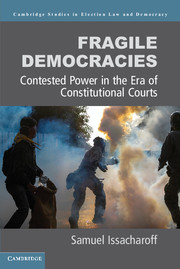The following is the third of three guest posts by NYU’s Sam Issacharoff about his new book, Fragile Democracies:
Recent American forays into the toppling of non-democratic regimes have stressed elections as the immediate goal, and often the only one. The history of post-World War II democracies is that such electoral moments tend to be short-lived. The first election either becomes the last election as power consolidates, or it becomes the last meaningful election as leaders for life emerge.
Elections in the absence of institutionalized democratic politics yield the ephemeral gains of the Arab Spring or the even more fleeting efforts at democratic governance in the Central Asian former republics of the USSR. The hard question is whether any strategy for consolidating democracy that depends upon courts can meaningfully forestall the descent into strong-man rule.
In the short run, the answer seems to be that courts can play this role. The confrontation with President Uribe in Colombia was the most direct, but courts have forced antidemocratic groups to temper their message to stand for office in India, Turkey, and Israel. Courts thwarted efforts to drive the opposition out of politics in Poland, to prevent outright fraud in the early days of Ukrainian democracy, to force the PRI to electoral accountability in Mexico.
A quarter century after the fall of the Berlin Wall, the question for the third wave of democracy is how stable will this new form of strong constitutionalism prove to be. The book’s answer is unfortunately tentative. The aim of new democracies is more than just having initially powerful courts, in much the same way that the holding of an initial election may be necessary but woefully insufficient. Where courts have been able to provide breathing room for the development of oppositional political institutions and bounded exercises of power, the experiment appears to be holding. But, as countries from South Africa to Thailand to Ukraine show, if these constraints do not take hold, the prospects for democracy are poor.
